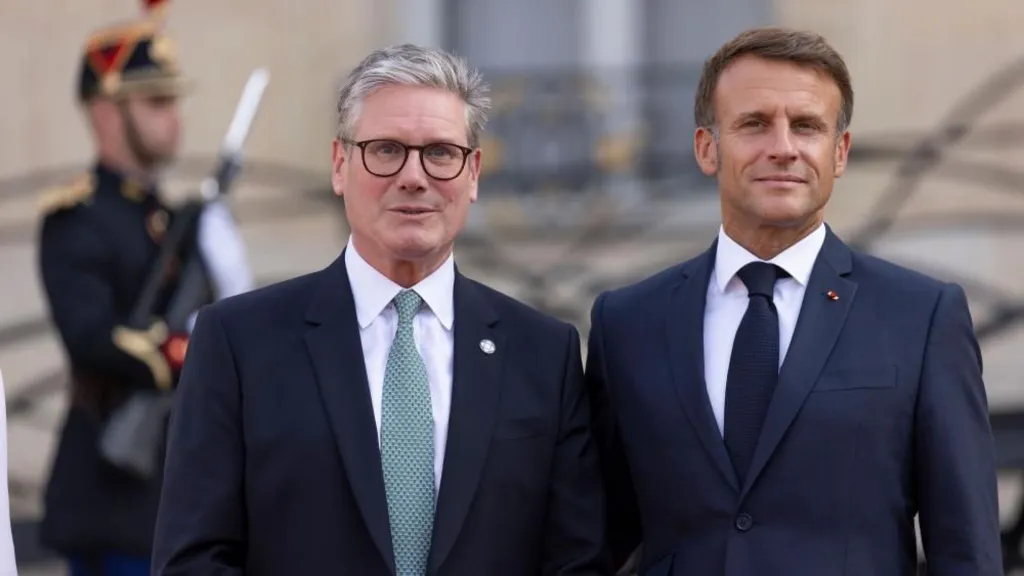
Prime Minister Sir Keir Starmer is set to meet with French President Emmanuel Macron in Paris on Monday to discuss key issues affecting European security, the ongoing conflict in Ukraine, and the implications of a potential second Donald Trump presidency. The meeting comes ahead of a ceremony at the Tomb of the Unknown Soldier, where Starmer will join other dignitaries in marking Armistice Day. The talks are expected to cover a range of topics, including the situation in Gaza and trade relations between the UK and France.
Starmer’s discussions with Macron will focus on Russia’s continued invasion of Ukraine, with both leaders stressing the importance of supporting Kyiv in its fight for sovereignty and territorial integrity. The UK and France have both emphasized that backing Ukraine is crucial to maintaining the security of Europe as a whole. However, as President-elect Trump prepares to take office for a second term, questions are emerging about the future of US support for Ukraine, especially after his campaign promise to end the war with Russia “in one day.”
While the specifics of Trump’s plan remain unclear, he has expressed his intention to impose a 20% tariff on imports into the US, which could have significant economic implications for Europe. His stance on NATO has also raised concerns, with Trump having previously urged NATO members to increase defense spending or face the consequences. During his presidential campaign, Trump refrained from providing details on how he would end the war in Ukraine, but his comments suggest he might seek a diplomatic deal that could involve compromising on issues like the Russian annexation of Crimea.
A former adviser to Trump, Bryan Lanza, suggested that Ukrainian President Volodymyr Zelensky should adopt a “realistic vision for peace” that accepts Russia’s territorial gains. However, a spokesperson for Trump quickly distanced him from Lanza’s remarks, emphasizing that the adviser did not speak for the president-elect.
The meeting between Starmer and Macron comes at a time of escalating tensions in Ukraine. Over the weekend, both Ukraine and Russia launched their largest drone attacks on each other since the start of the conflict. Russia’s defense ministry reported intercepting 84 Ukrainian drones over six regions, some of which were aimed at Moscow. In retaliation, Ukraine’s air force said it shot down 62 out of 145 Russian drones. The attacks mark a significant escalation in the aerial warfare between the two countries.
At the same time, the humanitarian situation continues to worsen in Gaza, with both Starmer and Macron expected to discuss potential actions to address the crisis. The ongoing conflicts in Ukraine and the Middle East have raised alarms about global security and stability, particularly as the US prepares for a shift in leadership.
In addition to security and foreign policy matters, trade will also be on the agenda. As a result of his proposed tariffs and stance on international relations, Trump’s policies are likely to affect trade between the US and its European allies. Starmer and Macron will likely discuss how the UK and France can continue to strengthen their trade relationships amid these changing circumstances.
Domestically, Starmer’s government has also been focused on defense spending. Treasury Minister Darren Jones recently announced that the government plans to increase defense expenditure from 2.3% to 2.5% of the national income, though it remains unclear when this target will be achieved. While Starmer’s stance on defense aligns with growing concerns about Russian aggression, some critics have questioned whether these spending increases will be sufficient to meet the challenges ahead.
On Sunday, Sir Keir Starmer participated in the National Service of Remembrance at the Cenotaph in London, where he joined other political leaders and members of the Royal Family in honoring those who died in the two world wars and subsequent conflicts. King Charles led the nation in a two-minute silence, a solemn tradition that will also be observed on Armistice Day at 11:00 GMT. This moment marks the end of World War I, when the Armistice was signed on November 11, 1918.
As Starmer prepares to meet Macron in Paris, the broader context of these talks reflects the growing complexity of international relations in the wake of Russia’s invasion of Ukraine and the shifting dynamics of US foreign policy under Trump. The Prime Minister’s discussions with Macron will likely help shape the UK’s strategy in navigating these challenges and ensuring the continued security and stability of Europe.








